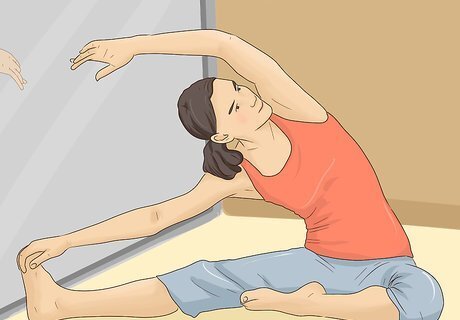
views
Warming up to Sing

Understand the benefits of warming up. Failing to properly warm up your voice can leave you unable to sing your full vocal range. Even worse, singing without warming up, especially singing a complex or challenging part, can do damage to your vocal folds and lead to vocal burnout.

Stretch to relax your body. Limber up your body by performing a few basic stretches. Be sure you stretch your arms, chest, and back, as these body parts all connect to and affect your vocal tract and torso. A relaxed upper body will produce a better quality of sound while singing, and reduce the chance of vocal damage. Massage your jaw to release tension contained in the muscles there and improve your vocal production. Using the heels of your hands or your fingertips, rub your face from below your cheekbone along your jawline toward your chin.

Hydrate your vocal folds. A poorly hydrated voice can leave you sounding garbled or your tone impure. You should drink plenty of water before singing, keeping away from drinking anything too hot or too cold. Room temperature beverages are the kindest to your voice. Serious vocalists should aim to drink anywhere from 6-8 glasses of water daily, though this number could change significantly based upon individual body type. You can put a little lemon juice into your water to add a dash of flavor and make your water more enjoyable. Another way to keep your vocal cords hydrated is to use a personal humidifier.

Run scales. Aim for a 2-octave scale in sixteenth notes, as this will allow your vocal folds to stretch more in preparation to sing. Start your scale from a pitch in your lower register, and smoothly ascend until you reach 2 octaves above your starting tone. Then smoothly descend to your starting pitch. Make sure to use your head-voice and sing from the diaphragm. The key here is to give your voice a good stretch. You can perform this exercise with many different sounds and tones. Try singing on the using the sounds, "me," "ee," and "oo."

Do lip trills. This is a good way to warm up the vocal cords with minimal strain on your voice. Keep your lips closed and push small amounts of air through them quickly to make a "brr" sound. The action is similar to blowing raspberries, and can be done at different pitches. Vary the length and intensity of the lip trills to get a good warmup. Check out this video of Celine Dion doing a lip trill: https://youtu.be/1NFz2Ff6ZlM

Improve air flow with an "S" sound. Too much air on high notes will make your vocal cords dab against each other, which can wear them out over time. Practice controlling your air flow with a hissing "S" sound for 15–20 seconds at a time. Look for tension in your voice when you sing high notes, as this is a sign of incorrect air flow. Another exercise to improve your air flow is to quickly blow air through a small coffee straw. Be sure to maintain good posture! Aching abs is a sign you're doing this exercise correctly.

Drill for enunciation. Also called diction, enunciation is how clearly you pronounce the words that you speak. Poor diction can lead to you getting tongue-tied while singing, or can result in the words you sing being unclear. There are many different exercises you might employ for the sake of diction, some you might try saying: Red lorry, yellow lorry, red lorry, yellow lorry. She sells sea-shells on the sea-shore. The shells she sells are sea-shells, I'm sure. For if she sells sea-shells on the sea-shore, then I'm sure she sells sea-shore shells. Betty Botter bought a bit of butter. "But," said she, "This butter's bitter. If I put it in my batter it will make my batter bitter. But a bit of better butter, that will make my batter better." Betty Botter bought a bit of better butter, better than the bitter butter, then she put it in her batter, now her bitter batter's better!

Adjust your warmup to the parts you're practicing. Relatively low soprano and mezzo-soprano parts can make it more difficult to sing dynamics clearly, so practice moving between forte, piano, and so on. Higher soprano parts require a great deal of air, so practice breathing exercises.
Exercising Your Voice to Sing Soprano

Assume the correct posture. The right posture will improve airflow and expand your vocal tract and torso to create the best sound. Even while sitting, the right posture can drastically improve the timbre and pitch of your voice. Generally, you should keep your spine erect, your shoulders back, and your chest held high, but comfortable. Keep your chin approximately parallel to the floor. Your stomach should be flat and firm, but ready to expand for abdominal breathing. Keep your hands relaxed and at your sides. Slightly bend your knees, never stand with knees locked. Place your feet shoulder width apart, with one a little in front of the other. If sitting, keep your back off the back of the chair.

Breathe deeply to engage abdominal breathing. Proper breath management is critical for sounding your best while singing, and is necessary to sing with skill. The diaphragm, which is a muscle along the bottom of your rib cage, moves down into the torso when you inhale to make room in your lungs for air. When you exhale, it squeezes in like an umbrella. This is what vocal instructors mean when they say, "Breathe from your stomach." What they mean is, "Breathe with your diaphragm in a controlled fashion." The more control you have over your breathing, the more breath support you'll be able to bring to your singing, creating a richer, fuller tone. When properly breathing with your diaphragm, you should feel a slight expansion and contraction when you breathe in the area between your sternum and belly button.

Sing arpeggios. Interval training can help you train your voice to greater precision. Since arpeggios are the notes of a chord sung in progression, this exercise is perfect for training sopranos. You'll likely have to make frequent, large interval jumps as a soprano, and practicing arpeggios will prepare you for this. If you are familiar with solfège, the arpeggio interval will fall on the notes Do-Me-Sol-Do for a full octave. On a keyboard, in the key of C this would translate to the ascending intervals middle C-E-G-high C.

Extend your vocal range safely. Work on perfecting the quality of the notes you can reach before you try to push past them to a higher or lower range. If you try exercises to extend your range higher, do so gradually and scale back your efforts immediately if your voice feels strained or hoarse. To avoid damaging your voice, work closely with a vocal coach if you are trying to make a significant change to your vocal range. If you notice strain, fatigue, or discomfort in your voice or throat, you may be singing a song that is too challenging. The highest note ever performed is the A above soprano C. It's incredibly rare for a vocalist to reach this note, so don't set your expectations too high.
Modify the way you pronounce consonants when singing soprano. When singing high notes, some consonant sounds need to be adjusted or dropped. For instance, sing an American "R" as a British "R" and an American "L" as an Italian "L" Modify the word so you're singing an "ah" vowel. The listener's ear will naturally correct the pronunciation to hear the word.

Let your voice rest after practicing. Give your voice time to recover after each practice sessions, taking a break from shouts, whispers, or other strains. Stop singing as soon as your voice feels strained, or your may cause long-lasting damage.

Join a choir. Singing with other people can be a great benefit to your voice. Not only will you be able to listen to the voices of other talented performers, but you'll also be able to see how these people perform. Ask questions of your choir mates about their method and tricks they use to improve their vocal quality and produce gorgeous sound. A large choir may divide their sopranos into 2 parts. First sopranos sing the highest notes and sometimes a descant (the higher melody). Second sopranos sing a slightly lower part.

Identify your type of soprano. The opera world divides sopranos into 5 categories: coloratura, soubrette, lyric, spinto, and dramatic. Parts written for different types of soprano may have slightly different ranges, and call for different vocal qualities. Figure out which type of soprano singing plays to your strengths, and focus on it. For best results, ask a qualified voice teacher to help you identify which type of soprano you are. Note that your vocal cords don't stop growing until you're around 20 years old, so your voice type may change over time.

Perform regularly. While a small minority of sopranos may sing for their own pleasure, the overwhelming majority of vocalists sing to be heard. The atmosphere of performances, however, will be very different from your relaxed practice sessions, so you'll need to practice performing as well. To do this you might: Volunteer to sing at a community event. Join a community choral group to gain performance experience. Form your own choral group with friends, classmates, or coworkers.

Hire a voice coach. A voice coach will guide you through typical soprano exercises while putting a well-trained musical ear to work for the betterment of your voice. Your voice coach can also help you identify weak points in your ability, and will assign exercises to you to improve these shortcomings.
Taking Care of Your Body to Sing Soprano

Exercise and eat healthy. The state of your body will influence the state of your voice. Just like sinus congestion leave you sounding nasally, a fit and trim body can help you attain a more consistent, purer vocal quality. A vocalist's instrument is her body, so you should: Eat a balanced diet. Do light exercise to maintain your soprano physique. Cardio exercise can help improve your breath control and support.

Listen to your body. Many vocalists wish to push their abilities to the next level by stretching their voice. In some cases, this can result in pushing too hard, doing sometimes irreparable damage to the voice. Always be sure to listen to your body when singing and practicing singing. If you ever feel voice fatigue or notice uncharacteristic changes in your voice, you should consult a professional. Some doctors are vocalist specialists, though if this kind of expert is not available to you, you may wish to consult an ears, nose, and throat doctor.

Avoid harsh substances. Certain substances can dry out your vocal folds, like caffeine and alcohol for example. Dry vocal folds will not be able to perform as well, so you should avoid these substances. Smoking can also irritate your voice, and can even cause changes in the tissue of your vocal folds.

Get a laryngoscopy at least once a year. This kind of procedure is use to check for irregularities on your vocal folds, like nodules and hemorrhages. Without proper treatment, these conditions or other pathologies can cause serious and sometimes permanent damage to your voice.

















Comments
0 comment